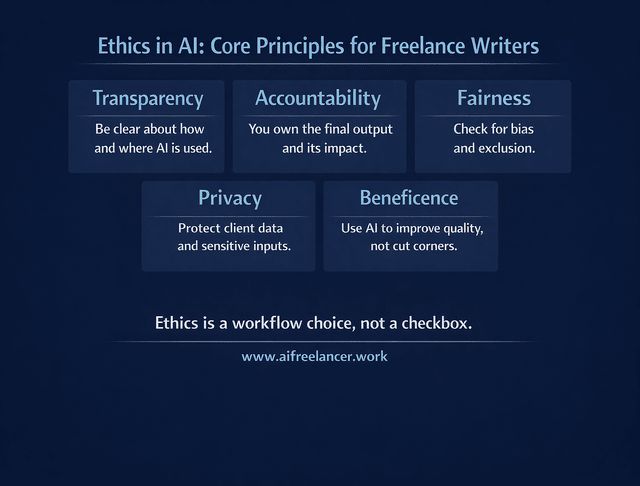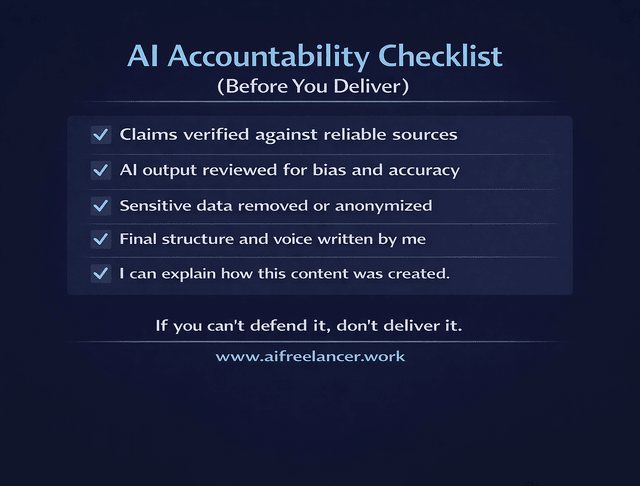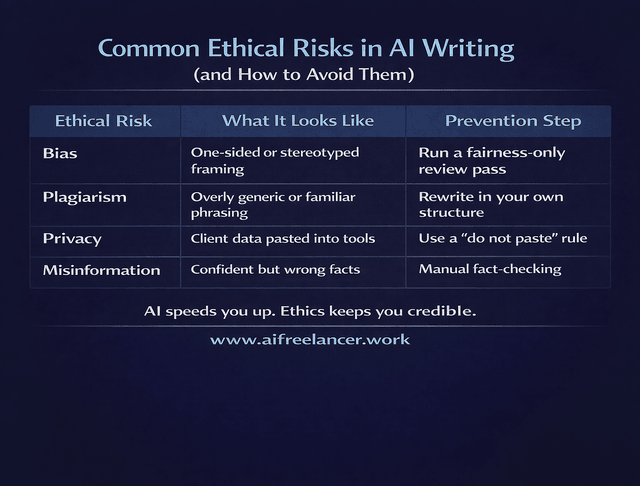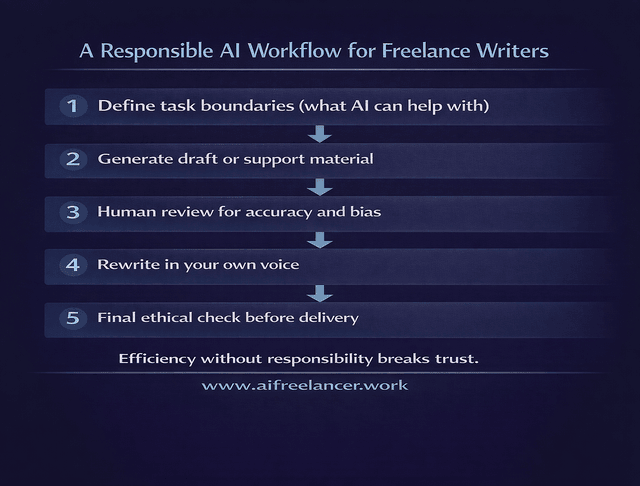
Understanding its ethical implications is crucial as artificial intelligence (AI) becomes increasingly integrated into freelance writing. Ethical considerations ensure the responsible use of AI and maintain trust and integrity in your content. This blog explores the importance of ethics in AI, especially for freelance writers, and provides guidelines for its responsible use.
Everything I’ve shared here—and more—is in my book, available on Amazon. Click the link if you’re ready to take the next step.
Understanding AI Ethics

AI ethics involves applying moral principles and guidelines to govern the development and use of artificial intelligence. These principles are essential to ensure that AI technologies benefit society while minimizing harm. As freelance writers increasingly rely on AI tools to enhance their productivity and creativity, understanding and adhering to these ethical principles is vital.
For freelance writers, ethics in AI is not an abstract concept. It is reflected in client expectations, how you handle sensitive information, and whether your output is fair, accurate, and original.
Fundamental moral principles in AI include transparency, accountability, fairness, privacy, and beneficence. In fact, Cisco’s 2024 Consumer Privacy Survey found that most people believe organizations have a responsibility to use AI only in ethical ways, so your choices as a writer aren’t just personal—they’re meeting a clear public expectation.
AI Ethics: Transparency
Transparency involves being open about how AI systems operate and make decisions. It is crucial for building trust between freelance writers and their clients. When using AI tools for content creation, writers should disclose their use to clients when it impacts the work, the workflow, or the client’s expectations. This disclosure builds trust and helps clients understand the generation process of their content.
For instance, if an AI tool helps generate article ideas or draft content, informing the client about this use can enhance transparency in the writing process. A global study by RWS found that more than four in five consumers want AI-created content to be clearly labeled, and most say that kind of transparency would increase their trust in the brand using it—strong evidence that honesty about AI isn’t a weakness, it’s a trust signal.
Practical transparency for freelancers can be as simple as stating what AI supported (ideation, outline, first draft, edits) and what you handled manually (final structure, fact-checking, voice, and accountability).
Ethics in AI: Accountability

Accountability ensures that creators and users of AI systems are responsible for their actions and the outcomes of AI applications. Freelance writers must be accountable for the content generated by AI, ensuring it meets ethical standards. This includes taking responsibility for errors or biases introduced by AI tools. For example, if an AI-generated article contains incorrect information, the writer must correct it and inform the client. Accountability also means regularly reviewing and updating AI tools to maintain high standards of accuracy and reliability.
In practice, accountability looks like this:
- You verify claims before publication.
- You keep notes on sources and decisions for sensitive topics.
- You treat AI output as a draft, not a source of truth.
- You can explain how you reached conclusions if asked.
AI Ethics: Fairness
Fairness in AI aims to prevent bias and discrimination. AI models can inadvertently perpetuate existing biases in the data they train on. Identifying and mitigating bias in AI models used for writing is crucial to ensuring the content is fair and inclusive. For freelance writers, this means using AI tools to minimize prejudice and being vigilant about the potential for biased outputs. Ensuring fairness involves continuous monitoring and the adjustment of AI models to avoid discriminatory practices.
A simple bias check for writers:
- Scan for stereotypes, loaded language, or “default” assumptions about gender, culture, class, or ability.
- Watch for one-sided framing (who is centered, who is blamed, who is omitted).
- If the topic is sensitive, add a second pass focused only on fairness and inclusion.
Ethics in AI: Privacy
Privacy involves safeguarding personal data and ensuring that AI systems comply with data protection laws. Handling client data responsibly and securely is vital for freelance writers using AI. This involves using secure AI tools that comply with data protection laws, such as the General Data Protection Regulation (GDPR), and actively safeguarding client information. For instance, freelance writers should ensure that any data input into AI tools is anonymized and that sensitive information is protected.
If you handle client materials (drafts, internal docs, customer data), build a “do not paste” rule for anything confidential unless the tool and the agreement explicitly allow it.
AI Ethics: Beneficence
Beneficence involves ensuring that AI technologies benefit society and do not cause harm. Freelance writers should use AI to enhance their work in a positive, ethical way. This principle emphasizes AI’s positive impact on the writing process, including improvements in efficiency, accuracy, and creativity. Writers should aim to use AI in ways that contribute to the quality of their work and the satisfaction of their clients. For example, using AI tools to perform thorough research or generate diverse content ideas can significantly benefit the writing process.
Adhering to these ethical principles can help freelance writers ensure their use of AI is responsible and beneficial. Understanding and implementing transparency, accountability, fairness, privacy, and goodwill in AI practices enhances the quality of their work. It builds client trust, leading to more successful and ethical freelance writing careers.
Ethical Challenges in AI for Freelance Writing

When using AI, freelance writers face several ethical challenges. Addressing these challenges is essential for maintaining ethical standards in AI.
Bias and Discrimination
One of the primary moral concerns with AI is the potential for prejudice and discrimination. AI models are trained on large datasets that often contain historical and societal biases. AI tools used for content creation can inadvertently perpetuate these biases.
For instance, an AI tool might favor certain perspectives or demographics, leading to biased content that could marginalize certain groups or viewpoints. This can have profound implications, particularly in sensitive topics like politics, social issues, or cultural discussions.
To address this, writers must actively identify and correct such biases. This involves scrutinizing the datasets used to train AI models and employing strategies to detect and mitigate bias. Ensuring fair and inclusive work not only upholds ethical standards but also enhances the credibility and reliability of the content.
Intellectual Property and Plagiarism
Another significant ethical challenge is determining the ownership of AI-generated content. The lines between human and AI contributions can blur, making it difficult to establish who holds the intellectual property rights.
This can lead to plagiarism issues if AI-generated content is not appropriately attributed. For freelance writers, ensuring originality is paramount. When an AI tool assists in generating article ideas or drafting content, it is essential to acknowledge its contribution. This not only avoids plagiarism but also maintains transparency with clients and readers. Properly crediting AI’s role can be part of ethical writing practice, ensuring that all sources and tools are appropriately recognized.
Also, remember: AI can unintentionally reproduce close phrasing from patterns in its training data. Treat AI output as raw material and rewrite in your own voice, with your own structure.
Data Privacy and Security
Responsible handling of client data is a critical ethical obligation for freelance writers using AI. AI often involves processing significant amounts of data, some of which may be sensitive or confidential.
Compliance with data protection laws, such as the General Data Protection Regulation (GDPR), is crucial to safeguard client information. Implementing robust data privacy measures, such as encryption and secure storage solutions, can mitigate the risks of data breaches and unauthorized access. Freelance writers must choose AI tools that prioritize data security and ensure their practices align with legal and ethical standards.
You must inform clients how you will use and protect their data, fostering trust and transparency.
Misinformation and Fake News
Ensuring the accuracy and reliability of AI-generated content is crucial, especially in an age where misinformation and fake news circulate rapidly. AI tools can sometimes produce content that is factually incorrect or misleading, with serious consequences.
Freelance writers must take proactive steps to verify the information generated by AI. This includes cross-referencing data with reputable sources and conducting thorough fact-checking. Using strategies to ensure content integrity helps you avoid spreading false information and maintain your reputation as a producer of trustworthy, reliable content.
Freelance writers must navigate ethical challenges when using AI, including bias and discrimination; intellectual property and plagiarism; data privacy and security; misinformation; and fake news. By addressing these challenges, writers can maintain high ethical standards and produce fair, original, secure, and accurate content.
Responsible Use of AI in Freelance Writing

Implementing best practices for ethical AI use ensures that freelance writers use AI responsibly. By following these practices, you can improve the quality of your content, build client trust, and maintain the integrity of the writing profession.
Regular Audits of AI Systems
Conducting periodic reviews of AI tools is crucial in identifying and addressing ethical issues. These audits help ensure that the AI systems used are free from bias and inaccuracies.
You should regularly audit the AI tools used for content creation to detect and correct biases that may skew content toward specific demographics or perspectives. By ensuring that AI produces fair and reliable content, writers can maintain the quality and inclusiveness of their work. Regular audits also help keep AI systems up to date with the latest ethical standards and technological advancements, preventing outdated or unethical practices.
A lightweight audit for freelancers: pick one recent draft per month, then check it specifically for accuracy, bias, originality, and privacy risk.
Continuous Learning and Adaptation
Staying up to date on advancements in AI ethics and best practices is essential for freelance writers. The field of AI is rapidly evolving, and new ethical challenges continuously emerge.
Continuous learning enables writers to adapt to these challenges and maintain high moral standards. Engage in professional development, attend workshops, and participate in online courses on AI ethics to gain the knowledge and skills needed to navigate the complexities of AI usage as a writer. This proactive approach ensures that writers know and are prepared to implement the latest ethical considerations.
Involvement of Human Oversight
Human oversight ensures that AI-generated content meets ethical standards. AI can significantly improve content creation efficiency, but it has flaws.
If you’re unsure how to set boundaries, a clear AI guide for freelance writers can help you define when and how to use AI responsibly in your workflow. Freelance writers should review and refine AI-generated content to ensure it aligns with ethical guidelines.
This human intervention helps catch errors or biases the AI may have introduced, ensuring the final content is accurate, fair, and moral. For instance, a writer might use AI to generate a draft and then meticulously review it to ensure it adheres to ethical standards and accurately conveys the intended message.
If you only add one safeguard to your workflow, make it this: never publish AI-assisted work without a final pass that is focused only on accuracy and harm.
Developing Ethical Guidelines
Setting clear ethical standards and creating a code of conduct for AI use are essential. This includes defining acceptable practices for using AI tools and ensuring compliance with these standards.
Ethical guidelines should cover data privacy, bias mitigation, transparency, and accountability. By establishing a robust ethical framework, freelance writers can consistently apply ethical principles in their work, ensuring that their AI use aligns with industry standards and client expectations.
Add a simple “client-ready” version of your guidelines so you can share them when clients ask how you handle AI.
Enhancing Transparency
Disclosing AI use to clients and being transparent about content-generation processes builds trust and fosters integrity. Informing clients about using AI tools for research or content creation helps manage their expectations and shows a commitment to ethical practices.
Being transparent about AI’s role in writing reassures clients that they receive content generated responsibly and ethically. This openness can enhance the client-writer relationship, increasing client satisfaction and trust.
By implementing these best practices, freelance writers can leverage AI effectively while maintaining high ethical standards. Regular audits, continuous learning, human oversight, ethical guidelines, and transparency collectively ensure responsible and ethical AI use in freelance writing.
Case Studies and Examples
Examining case studies and examples reveals how to use AI in freelance writing ethically, offering valuable insights into best practices and pitfalls to avoid.
Positive Examples of Ethical AI Use
You can use AI ethically for content personalization and research assistance. For instance, AI-driven tools can analyze audience data to tailor content to specific preferences, enhancing engagement and relevance.
An example is using AI to adjust an article’s tone and style based on the target audience’s demographics, thereby increasing reader satisfaction. Additionally, AI tools that assist in gathering and organizing research data can significantly streamline the writing process while ensuring accuracy and comprehensiveness.
For example, an AI tool that compiles up-to-date research on a given topic can save writers time and provide reliable information, thereby improving the quality of their work.
Negative Examples and Lessons Learned
There have been notable instances where AI bias in writing led to controversial and discriminatory content. For example, AI models trained on biased data have produced content that perpetuates stereotypes or excludes certain groups, causing public backlash and damaging the credibility of the content creator.
Learning from such cases emphasizes the need for continuous monitoring and adjusting AI systems to mitigate bias. Data breaches involving AI tools highlight the importance of robust data privacy and security measures.
For instance, improper handling of sensitive client data by AI tools can lead to significant breaches of trust and legal repercussions, underscoring the critical need for compliance with data protection laws and best practices in data security.
For freelancers, the lesson is simple: your name is attached to the outcome, even if the tool created the first draft.
Future Directions in AI Ethics for Freelance Writing
Emerging trends and proactive measures to address ethical challenges are shaping the future of AI ethics in freelance writing. It’s essential to stay updated with these developments to maintain ethical standards and ensure the responsible use of AI.
Emerging Trends
Advances in ethical AI research and the introduction of new regulatory frameworks are significantly influencing the landscape of AI ethics. Researchers continuously explore ways to make AI systems more transparent, accountable, and fair.
For freelance writers, this means staying informed about these advancements and understanding how they impact AI tools used for content creation. Governments are creating new regulatory frameworks, including stricter data protection laws and AI usage guidelines, to ensure responsible AI use. By familiarizing yourself with these regulations, you can adapt your techniques to comply with legal and moral standards.
Preparing for Ethical Challenges
Taking proactive measures, such as anticipating ethical dilemmas and engaging in ethical training, is essential for navigating future challenges. Ethical training programs that identify and mitigate bias in AI models are particularly beneficial.
For instance, understanding how bias can influence AI-generated content and learning techniques to address these issues ensures fair and inclusive content creation. Additionally, regular ethical audits and ongoing education on emerging ethical considerations equip freelance writers to address complex ethical issues effectively. By embracing these proactive measures, you can enhance the integrity and trustworthiness of your work in an evolving AI landscape.
Final Thoughts
Understanding and addressing the ethics of AI is crucial for freelance writers. You can use AI responsibly and ethically by following best practices, developing ethical guidelines, and staying informed about emerging trends. Embracing ethics in AI enhances the quality of your work and builds trust and integrity in your freelance writing career.
Ready to put ethical AI into practice?
If you want clear, practical guidance on using AI responsibly as a freelance writer, my books walk through real workflows, decision frameworks, and ethical safeguards you can apply immediately. Visit my Amazon Author page to explore resources designed to help you maintain quality, credibility, and trust while working with AI.
Frequently Asked Questions About Ethics in AI
Yes—when used transparently and responsibly. AI can assist with research, drafting, and editing, but writers should remain accountable for accuracy, originality, and final decisions. Ethical use means AI supports your work, not replaces your judgment.
In most cases, disclosure is recommended. Being open with clients about AI-assisted tasks builds trust, clarifies expectations, and ensures transparency. It also avoids misunderstandings about authorship or workflow.
Writers should review all AI-generated output carefully, check for biased or stereotyped language, and adjust anything that may be biased or misleading. Human oversight is essential because AI can unintentionally reproduce patterns from its training data.
It can be if not handled properly. Writers should ensure AI-generated text is original, verify sources, and avoid passing AI output off as research or factual reporting without checking it. Attribution may be needed when AI plays a significant role in generating ideas or structure.
Use AI platforms with strong privacy standards, avoid entering sensitive information unless necessary, and anonymize client data whenever possible. Choosing tools that comply with data protection regulations helps safeguard confidentiality.

Florence De Borja is a freelance writer, content strategist, and author with 14+ years of writing experience and a 15-year background in IT and software development. She creates clear, practical content on AI, SaaS, business, digital marketing, real estate, and wellness, with a focus on helping freelancers use AI to work calmer and scale smarter. On her blog, AI Freelancer, she shares systems, workflows, and AI-powered strategies for building a sustainable solo business.

